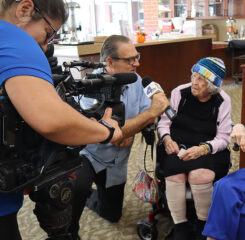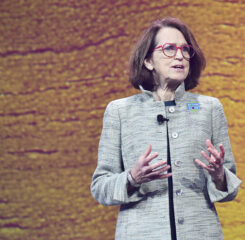Let’s Be Catalysts for Change
During his January 1941 inaugural address—presented as the world found itself on the brink of World War II—President Franklin D. Roosevelt asked all Americans to take one simple action: “to pause for a moment and take stock, to recall what our place in history has been, and to rediscover what we are and what we may be.”
I tried my best to follow this advice in the early days of the coronavirus pandemic. After pausing and taking stock, it was clear to me that all of us—LeadingAge, its members, and the entire field of long-term services and supports (LTSS)—had been thrust into a singular moment in history. We suddenly found ourselves working on the frontlines of the most vicious pandemic in over a century.
The trauma we experienced and the challenges we faced over the past 9 months helped us all rediscover what we are: mission-driven organizations with a deep appreciation for the value of every life under our care.
Now, it’s time to imagine, in the words of FDR, “what we may be” when this health crisis is over.
We need this kind of imagining now more than ever. We are not going back to where we were before COVID-19 turned our lives upside down. Every flaw and crack in our public health, health care, and LTSS systems has been exposed. The fractures are too great to patch back together. It’s time, as the poet Leslie Dwight tell us, to “Declare change. Work for change. Become the change.”
During my keynote address at the LeadingAge Annual Meeting Virtual Experience, I asked members to imagine a different world. I offered my dreams for what that world might look like:
Funding and regulations would be malleable and flexible enough so that older adults could create their own program or package, care models would mold to individual needs, and transitions between and among services would be seamless and natural.
Direct care workers would be treated like the skilled professionals they are, and we would acknowledge the mental strain, as well as the physical strain, of their jobs.
A safe and affordable place to live would be a right, and no older adult would be left homeless or under-housed.
Every older adult in every corner of the country would have equal access to affordable, quality care and coverage delivered with cultural understanding and professional competence.
A focus on elder justice would result in a dramatic reversal in incidences of elder abuse.
Dramatic shifts in attitude about older adults would lead to more empathy, understanding, and respect—and help us finally accept and tackle the many examples of ageism in society.
We would all develop a deeper understanding of our differences and learn to respect and admire our neighbors for who they are.
Policymakers would have the political will to develop a system to pay for LTSS in a fair and rational way.
The year 2020 has been a horrendous one in so many ways. But I believe it also offers us an unprecedented opportunity. As leaders in a crucial sector of our economy, we now have an opportunity to decide what kind of LTSS system we want to create—to reinvent our field for the future.
We have an opportunity to apply our collective imagination to this task. I’ve shared with you my ideas, dreams, and vision. Now, I’m asking you to do the same. I look forward to combining all of our ideas and dreams into a collective vision for our different future.
Certainly, we have steep hills to climb. But I also know that this community of LeadingAge is up to the task. We can be the driving force for dramatic changes at the federal, state, and local levels. Our new job is to be catalysts for change.

Most Recommended
November 08, 2024
 HOTMA: New Rules for Housing
HOTMA: New Rules for Housing
November 06, 2024
 Colleagues on the Move, November 6, 2024
Colleagues on the Move, November 6, 2024
November 06, 2024
 Analysis: What Does the Final CY2025 Home Health Rule Include?
Analysis: What Does the Final CY2025 Home Health Rule Include?
October 29, 2024
Katie Smith Sloan Urges Members to Build a Movement, Take Action
Recently Added
December 10, 2024
4 Top Tech Themes from 2024
December 09, 2024
 Analysis: What’s Changing with the Home Health CAHPS Survey?
Analysis: What’s Changing with the Home Health CAHPS Survey?
December 09, 2024



